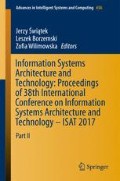Abstract
The paper is devoted to a quantitative approach to support of strategic planning to control international conflicts. The MUT team, taking part in Polish-American “tabletop” games, has proposed a set of methods and tools to analyze possible moves to resolve a hypothetical conflict along a front line in northeastern Europe. Both the model and some experimental results are presented in the paper. Decision support was proposed as a set of statistical, optimization and simulation tools for conflict scenario preparation and analysis. The range of quantitative methods and the choice of appropriate research tools in the experiments are described. The strategic game was divided into two phases: D1 – escalation of the conflict in the B states – determination of effectiveness measures, such as the opponent’s estimation of the probability that the conflict will escalate (Bayesian Network Model); D2 – conventional conflict: Evaluation of effectiveness measures on our side (evaluation of force potential and structure required, simulation analysis of combat clashes). The presentation below focuses on D1.
Access this chapter
Tax calculation will be finalised at checkout
Purchases are for personal use only
References
Antkiewicz, R., Gąsecki, A., Najgebauer, A., Pierzchała, D., Tarapata, Z.: Stochastic PERT and CAST logic approach for computer support of complex operation planning. In: ASMTA 2010, Lecture Notes in Computer Science, vol. 6148, pp. 159–173. Springer, Heidelberg (2010)
Chang, K.C., Lehner, P.E., Levis, A.H., Zaidi, A.K., Zhao, X.: On causal influence logic. Technical report, George Mason University, Center of Excellence for C31 (1994)
Drużdżel, M.J.: Rapid modeling and analysis with QGENIE. In: Proceedings of the International Multiconference on Computer Science and Information Technology, vol. 4, pp. 157–164 (2009)
Haider, S., Levis, A.H.: Effective courses of action determination to achieve desired effects. IEEE Trans. Syst. Man Cybern. Part A Syst. Hum. 37(6), 1140–1150 (2007)
Rosen, J.A., Smith, W.L.: Influence net modeling with causal strengths: an evolutionary approach. In: Proceedings of the Command and Control Research and Technology Symposium, Naval Post Graduate School, Monterey, 25–28 June 1996
Wagenhals, L.W., Levis, A.H.: Course of action development and evaluation. In: Proceedings of the 2000 Command and Control Research and Technology Symposium (2000)
Wagenhals, L.W., Levis, A.H.: Course of action analysis in a cultural landscape using influence nets. In: Proceedings IEEE Symposium on Computational Intelligence for Security and Defense Applications, Honolulu (2007)
Zaidi, A.K., Mansoor, F., Papantoni-Kazakos, T.P.: Theory of influence networks. J. Intell. Rob. Syst. 60, 457–491 (2010)
Author information
Authors and Affiliations
Corresponding author
Editor information
Editors and Affiliations
Rights and permissions
Copyright information
© 2018 Springer International Publishing AG
About this paper
Cite this paper
Najgebauer, A., Antkiewicz, R., Pierzchała, D., Rulka, J. (2018). Quantitative Methods of Strategic Planning Support: Defending the Front Line in Europe. In: Świątek, J., Borzemski, L., Wilimowska, Z. (eds) Information Systems Architecture and Technology: Proceedings of 38th International Conference on Information Systems Architecture and Technology – ISAT 2017. ISAT 2017. Advances in Intelligent Systems and Computing, vol 656. Springer, Cham. https://doi.org/10.1007/978-3-319-67229-8_26
Download citation
DOI: https://doi.org/10.1007/978-3-319-67229-8_26
Published:
Publisher Name: Springer, Cham
Print ISBN: 978-3-319-67228-1
Online ISBN: 978-3-319-67229-8
eBook Packages: EngineeringEngineering (R0)

